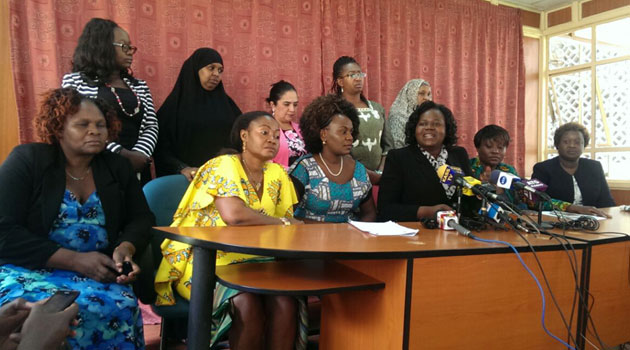
Women parliamentarians ran a vigorous last minute campaign to steer support for the two-thirds gender rule Bill, which will placed for second reading in parliament today.
Kenya Women Parliamentary Association (KEWOPA) lobby group met political party leaders, Kenya Editors Guild, fellow parliamentarians and civil society leaders to push for a needed two-third majority needed to pass the Bill.
“It is a constitutional requirement that we must meet at all costs. We are already late on this. The time is now to ensure fair gender representation in parliament,’’ Kirinyaga woman representative Purity Ngirici said.

Rosa Buyu and Kandara MP Alice Wahome thanked President Uhuru Kenyatta and Deputy President William Ruto for endorsing the Bill at the weekend.
This will be the second time the Bill will be coming to Parliament after MPs rejected it in May 2016 despite intense lobbying.
The Bill was supported by a paltry 178 members, far below the required 233 votes. Out of the 180 MPs present, 16 voted against the bill while five did not vote. As many as 150 MPs out of the 349 did not show up.
The parliamentary women association and the National Gender and Equity Commission (NGEC) took media through the cost implications of implementing the two-thirds gender rule.

Taxpayers will shoulder an extra Sh482.1 million every year to implement the law sponsored by Aden Duale, Majority leader in Parliament.
According to Institute of Economic Affairs CEO Kwame Owino, the cost is less than one per cent of total government expenditure.
“Each Kenyan will pay between Sh6 and Sh10 per year to pay salaries of 39 women MPs and two more Senators needed to hit one-third threshold. This is on assumption that each of those leaders is pocketing a maximum of Sh980,000 per month,’’ Owino said.
The National Assembly has 76 women, representing 21.77 per cent of total members, a shortfall of at least 39 to meet the required threshold.

The Senate is only two members shy of the constitutional requirement of at least 33 per cent. The House has 67 members.
NGEC commissioner Florence Wachira said Kenya is ranked poorly in terms of gender representation despite having rich constitutional provision.
She cited a UN report released in January that ranked Kenya behind her neighbours.
“The report ranked Kenya sixth in East Africa, behind Rwanda, Uganda, Tanzania, Burundi and even a younger democracy like South Sudan,”Wachira said.

Kenya has only 22 per cent of women in the National Assembly and 31 per cent in Senate. Rwanda which led the region has 61 per cent followed by Tanzania and Burundi at 36 per cent respectively. Uganda and South Sudan had 34 and 28.5 per cent respectively.
“It is not about women, but fairness to all genders,’’ Kandara MP Alice Wahome said.